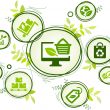Local governments rely on ICMA to help make communities more resilient and sustainable
ICMA is a global association of professional city and county managers and other employees who serve local governments. In addition to offering a variety of powerful programs, including an initiative that aims to achieve equity and social justice, to affirm human dignity, and to improve the quality of life for the individual and the community, the organization also has a bounty of programs covering resilient and sustainable communities.
ICMA looks at how local government leadership can capitalize on the connections between economic, social and environmental sustainability to create thriving and livable communities. The organization offers several resources on the topic, including an Energy Efficiency Checklist for Local Governments and Sustainability Model Codes and Resources. Go here to join, renew or reinstate your ICMA membership.
Research is a key component of ICMA’s offerings to local governments. On the sustainability front, ICMA issued a landmark publication, “The 2015 Local Government Sustainability Practices Survey Report.” According to Tad McGalliard, ICMA’s director of research, development and technical assistance, ICMA will likely do a follow-up survey in 2022. “I don’t see how we can’t do a survey this year. Our focus going forward is we will tie more into infrastructure actions, policies and programs and certain economic issues and trends.”
It appears ICMA is well along the path of advocating for more sustainable local governments. “We’ve done a fair amount of work. I just wrote an internal white paper that traced our activities back to the 1960s. Environmental laws in the U.S. really started getting passed rapidly mid- to late-1960s and then throughout the 1970s and 1980s. We covered all the bases since that burst of energy around environmental law and legislation,” McGalliard tells Co-op Solutions. From those environmental laws, McGalliard says that local governments developed regulations that often impacted government operations and community activities. He says ICMA research now covers more encompassing frameworks, such as sustainability, climate change and resiliency.
McGalliard says his research team tries to produce research products of substance at least once a year. “We offer a variety, whether it is a new report or some addition to our website, annual conference sessions, webinars—different kinds of things. All of them are working to help local government managers so they continue to think about sustainability and climate change.”
Sustainable procurement
Sustainability can be incorporated in a city’s procurement operations, McGalliard believes. “The RFP is the main way that cities procure programs, products and services from third parties. There are certainly ways of incorporating sustainability clauses and elements into those requirements that an outside party must meet. Some of those can be more onerous than others, depending on what the local government is looking at, such as the most sustainable options available.” He adds that an RFP could be a good way to solicit some heretofore unknown sustainable practices and techniques.
McGalliard urges local governments to determine their sustainability priorities. He suggests they figure out which eco-labels meet their agency’s needs. The labels can include EPA’s ENERGY STAR program for appliances and equipment. Another potential eco-label is the LEED (Leadership in Energy and Environmental Design) system. It is the most widely used green building rating system in the world. The U.S. Green Building Council is the provider.
McGalliard says cooperative contracts can be used to advance a local government’s sustainable procurement policy or sustainability initiatives. He points to state contracts that local governments can piggyback on, to buy into and buy from. “Some of those contracts, I imagine, have some opportunities for more sustainable procurements.”
He adds that “There are a lot of areas in which cooperative purchasing is already likely occurring and probably could be done better.” He points to the growing future need for alternative-fueled public transit as well as school buses, in addition to expanding bicycle- and scooter-sharing operations. “If there is some way of connecting up organizations and governments that may have similar types of fleet needs, there are lots of opportunities to increase a community’s sustainability as more and more electric vehicles come online.” McGalliard says school districts could use cooperative purchasing to upgrade their school bus operations to EV fleets. He says regional transit or transportation enterprises or individual city and county fleets could use the same contracts.
McGalliard expects 2022 is going to be an active year for ICMA. “Assuming budgets get passed at the federal level, there will be dollars available like the American Rescue Plan Act of 2021 (ARPA) funding that came to states and cities. There will be generational dollars and opportunities to give grants for sustainability and climate change—things that local governments may be interested in.”
Michael Keating is senior editor for American City & County. Contact him at [email protected].




















